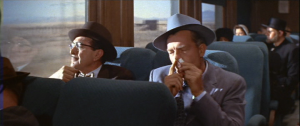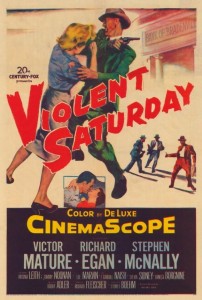 Violent Saturday (Richard Fleischer, 1955, 91 min)
Violent Saturday (Richard Fleischer, 1955, 91 min)
UW Cinematheque, Saturday, May 3, 7:00pm»
If you’re going to screen a film with this title, shouldn’t it be on a Saturday? UW-Cinematheque thinks so, obliging us as they so often do with a 35mm print of Violent Saturday, a film that begins with a boom, albeit a blast at a copper mine in the small town of Bradenville.
Three bank robbers (including a youngish Lee Marvin) arrive in town to rob the Bank of Bradenville, and that heist provides the framework for the plot. Those looking purely for a heist film may be disappointed, though, as Fleischer’s film mixes heist with pure 1950’s melodrama. Victor Mature plays a supervisor at the mine, who is struggling with his young son’s shame that he wasn’t a war hero like the boy’s best friend’s dad. There is the almost obligatory rich, drunken owner of the mine, whose wife cheats on him regularly. Add to this mix a bank manager who, when he isn’t going after a local librarian (Sylvia Sidney) for being late on payments, is an almost nightly peeping tom on one of the local nurses. If all of those characters and plot lines aren’t enough for you, did I mention Ernest Borgnine plays an Amish farmer?
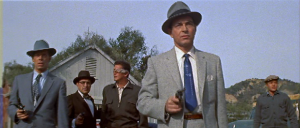 Being more of a heist aficionado than a lover of melodrama, I could have done with a more traditional heist film structure, but I was surprisingly pleased at how well all of the players and pieces of this network narrative came together. Some worked better than others; I can’t help but feel that Ms. Sidney got the short end of the stick. Her few scenes are outstanding, especially when she catches the bank manager in the midst of his nighttime voyeurism. While light on complexity of planning, the robbery itself is 10 minutes of bravura staging and execution. There are also a few choice hard-boiled lines peppered throughout the script, such as, “She moves like a Swiss watch,” and, “You know what you are, Roy? You’re a drooler.”
Being more of a heist aficionado than a lover of melodrama, I could have done with a more traditional heist film structure, but I was surprisingly pleased at how well all of the players and pieces of this network narrative came together. Some worked better than others; I can’t help but feel that Ms. Sidney got the short end of the stick. Her few scenes are outstanding, especially when she catches the bank manager in the midst of his nighttime voyeurism. While light on complexity of planning, the robbery itself is 10 minutes of bravura staging and execution. There are also a few choice hard-boiled lines peppered throughout the script, such as, “She moves like a Swiss watch,” and, “You know what you are, Roy? You’re a drooler.”
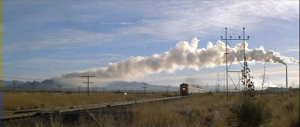
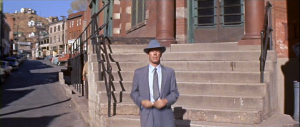 What fascinated me most about this picture was its setting, or more to the point, how its setting was photographed. Bradenville can in one shot seem like a claustrophic alley of small town commerce, and in the next, it can open up with either rural beauty or the rocky setting of the mine. Fleischer and cinematographer Charles G. Clarke always choose the most oblique positions for their camera, so that whether on location (Bisbee, Arizona) or in studio, it sometimes seems like there is barely a right angle in this town. The camera movement is particularly enjoyable in the scene in the hotel room as the robbers polish off their planning, starting out with all three in the establishing shot and then gently panning back and forth, pairing them off as they converse, to end with all three back in the shot once more—all in a single take.
What fascinated me most about this picture was its setting, or more to the point, how its setting was photographed. Bradenville can in one shot seem like a claustrophic alley of small town commerce, and in the next, it can open up with either rural beauty or the rocky setting of the mine. Fleischer and cinematographer Charles G. Clarke always choose the most oblique positions for their camera, so that whether on location (Bisbee, Arizona) or in studio, it sometimes seems like there is barely a right angle in this town. The camera movement is particularly enjoyable in the scene in the hotel room as the robbers polish off their planning, starting out with all three in the establishing shot and then gently panning back and forth, pairing them off as they converse, to end with all three back in the shot once more—all in a single take.
Sadly, the only DVD copy of this film contains a barely serviceable, non-anamorphic transfer. The film is streaming on Amazon Instant, but I can’t imagine the quality is that much better than that of the disc. All of which is to say, go see this film the way we all should: on the big screen in crisp 35mm at the Cinematheque. Then, in the midst of Violent Saturday’s moralizing melodrama, you too can learn the most important lesson of this film: the only thing more dangerous than Lee Marvin…is Lee Marvin with a cold.
